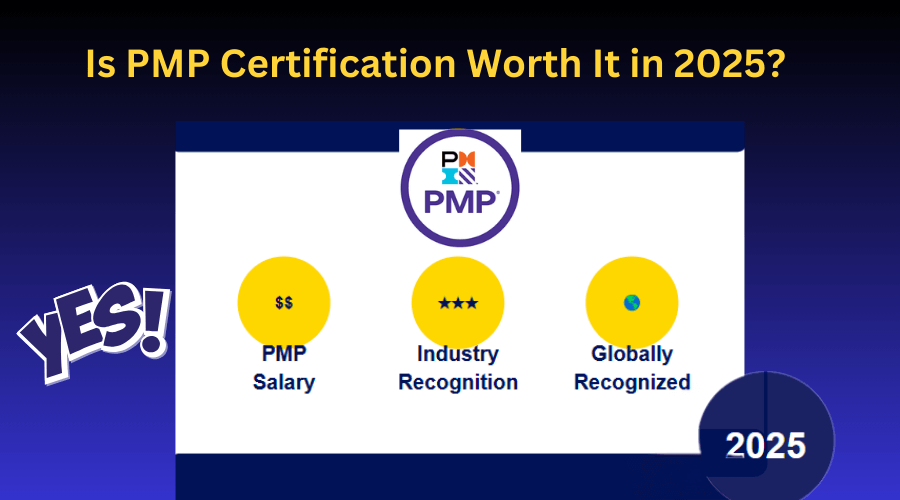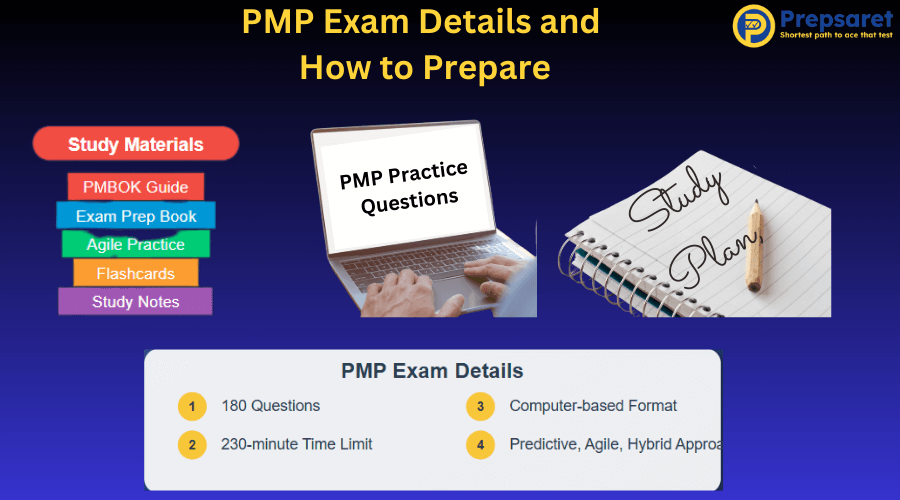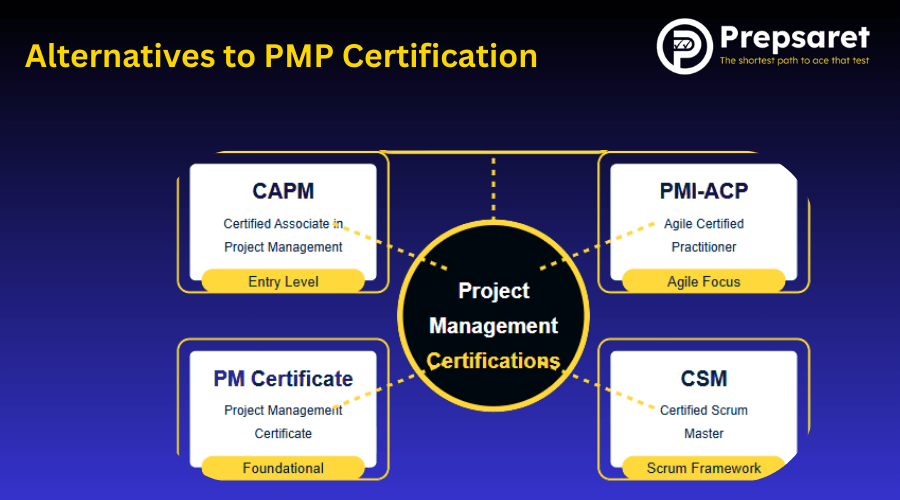If you’ve been wondering, “Is a PMP Right for You?” you’re not alone! The PMP certification has become a hot topic in the world of project management, and for a good reason. In today’s competitive job market, getting PMP certified can take your project management career to the next level. But with so many certifications out there, is it really worth your time and effort in 2025?
The short answer is: it depends. Whether you’re a seasoned project manager or just starting out, PMP certification has a reputation for helping professionals stand out, earn higher salaries, and open up new career opportunities. But before you take the plunge, you need to decide if it’s the right choice for you.
In this article, we’ll break down everything you need to know to help you answer the big question: Is PMP certification worth it in 2025?
And don’t worry – when you’re preparing for the PMP exam, resources like Prepsaret can make all the difference, helping you focus on what matters most for success.
So, let’s dive in and see if a PMP certification is the right move for your future!
What is PMP Certification?
The PMP certification is a globally recognized credential that showcases your expertise in project management. Issued by the Project Management Institute (PMI), it confirms that you have the knowledge, skills, and experience necessary to lead projects effectively and efficiently.
To earn the PMP credential, professionals must meet specific requirements, including a combination of project management education and hands-on experience.
The certification process involves passing the PMP exam, which tests your understanding of project management principles, methodologies, and practices. It’s not just about knowledge – it’s about demonstrating the ability to apply that knowledge in real-world situations.
The value of becoming a PMP certified professional extends across industries. Whether you’re in construction, IT, healthcare, or finance, employers across the globe recognize the PMP certification as a symbol of expertise.
Who Should Pursue PMP Certification?

Who should consider pursuing PMP certification? Well, the answer depends on where you are in your project management journey. It is particularly beneficial for both experienced project managers and those at the entry level to pursue project management certification.
Experienced Project Managers
If you’ve been managing projects for a few years, the PMP certification can take your career to the next level. Here’s why:
- You already have project management experience and have likely led multiple projects.
- The PMP credential will validate your expertise and give you the edge over other professionals in the field.
- It will help you sharpen your project management skills
- PMP certification can also lead to higher-paying roles and better opportunities for career advancement.
Entry-Level Project Managers
Even if you’re just starting out, pursuing the PMP certification can be a smart move if you’re serious about project management. You might need some additional project management education to qualify, but here’s why it could work for you:
- The PMP certification sets you apart from other entry-level candidates by showing potential employers that you’re committed to your career.
- It can help you quickly build credibility and show that you have the foundational skills necessary to lead projects.
- While it might take some time to gain the required project management experience, the certification can accelerate your growth in the industry.
The PMP certification is about demonstrating that you can drive project outcomes and manage complex projects effectively.
If you want to be seen as a good project manager who can deliver successful projects, PMP certification is a powerful step in the right direction.
Check Out: How to Get PMP Certification: Steps, Tips and Resources
Is PMP Certification Worth It in 2025?

If you’ve been wondering, “Is PMP Certification Worth It in 2025?”, the answer is a definite yes! The PMP certification continues to grow in value, and in 2025, it remains one of the most powerful credentials for project managers around the globe.
PMP Salary
One of the most significant benefits of becoming PMP certified is the potential for a higher salary. Here’s how PMP certification impacts salaries in different roles:
- Project Manager (PMP Certified): Average salary of $115,000 per year.
- Senior Project Manager (PMP Certified): Average salary of $130,000 per year.
- IT Project Manager (PMP Certified): Average salary of $120,000 per year.
- Construction Project Manager (PMP Certified): Average salary of $125,000 per year.
- Project Management Consultant (PMP Certified): Average salary of $140,000 per year.
In comparison, non-certified project managers earn about $95,000 per year on average. The PMP certification can increase your salary by up to 20%, with the potential to climb even higher as you gain more experience and advanced project management skills.
Industry Recognition
The PMP certification is widely recognized across multiple industries, ensuring that your skill set is respected and trusted by employers everywhere.
- IT Industry: Project managers with PMP certification are seen as the gold standard in managing IT projects, leading to higher chances of securing critical roles.
- Healthcare: In healthcare project management, PMP certification validates your ability to handle sensitive and complex healthcare projects with precision.
- Construction: The construction industry is increasingly turning to PMP certified project managers to oversee large-scale, multi-phase construction projects.
- Finance: As the financial sector grows, PMP certified project managers play an essential role in managing finance-driven projects with accuracy and efficiency.
By obtaining PMP certification, you stand out from the crowd, gain credibility, and attract more opportunities to lead teams and drive successful projects across various sectors.
Globally Recognized
One of the key advantages of the PMP certification is its global recognition. It’s one of the few credentials that is respected and accepted worldwide.
- International Job Opportunities: Recognized in over 200 countries, the PMP certification opens doors to global career opportunities.
- Cross-Border Projects: Many employers prefer PMP certified managers for handling complex, international projects.
- Top Companies Worldwide: Leading firms like Google, Microsoft, IBM, and Shell prioritize PMP certified professionals for their project teams.
With these advantages, PMP certification remains one of the best investments for any project management professional, whether you’re looking to advance in your current role or explore new international opportunities.
What Are the PMP Certification Requirements?
To earn the PMP certification, you must meet these key PMP certification requirements:
Project Management Experience:
- Four-Year Degree: Requires 3 years (36 months) of project management experience, traditionally including 4,500 hours of leading and directing projects.
- Secondary Degree: Requires 5 years (60 months) of project management experience, traditionally including 7,500 hours of leading and directing projects.
Project Management Education: You must complete 35 hours of project management education from an accredited provider.
PDUs for Maintenance: Maintaining your PMP certification requires you need to earn 60 Professional Development Units (PDUs) every three years. This is accurate and essential for keeping your certification active.
Find Out: How to Earn 60 Free PDUs for PMI’s PMP Certification Renewal
The Cost of PMP Certification: Is it Worth the Investment?
PMP Exam Fee:
PMP certification costs less if you have PMI membership.
- Project Management Institute (PMI) Members: $405
- Non-Members exam fee: $555 (membership is $129)
Study Materials
Study materials typically range from $100 to $500, but you can find affordable and effective options starting at just $69. You can enroll in these structured courses that let you study at your own pace. Choose a timeline that works best for you:
Is PMP Worth the Investment?
Yes! While the PMP certification involves an upfront cost, the long-term benefits such as higher salaries, greater job security, and more career advancement opportunities make it a valuable investment for any serious project manager.
PMP Exam Details and How to Prepare

The PMP exam consists of 180 questions that must be completed within a time limit of 230 minutes. The PMP exam format includes various types of questions, such as:
- Multiple Choice: Select the best option from four choices.
- Multiple Responses: Choose more than one correct answer from the provided options.
- Matching: Match items from two columns.
- Hotspot: Select a specific area on a diagram.
- Limited Fill in the Blank: Provide the correct answer to fill in the blank.
The questions are divided into three performance domains:
- People (42%): Focuses on the soft skills required to lead a project team.
- Process (50%): Covers the technical aspects of managing projects.
- Business Environment (8%): Highlights the connection between projects and organizational strategy.
PMP Exam Preparation
Effective PMP exam preparation is crucial for success. Utilizing study resources and strategies can greatly enhance your understanding of project management concepts. Key strategies include:
- Creating a study plan that allows ample time for review.
- Using official Project Management Institute (PMI) resources and study guides, like the Project Management Body of Knowledge (PMBOK)
- Joining study groups or forums to discuss topics with peers.
Additionally, using platforms like Prepsaret can greatly improve your preparation. Prepsaret provides a structured online PMP test prep course with a range of resources designed specifically for PMP candidates, including:
- Study materials that are aligned with the latest exam format
- Interactive learning modules to reinforce key concepts
- Practice questions with well explained answers
One of the standout features of Prepsaret is its practice tests, which closely reflect the actual PMP certification exams. These practice tests help improve exam readiness by:
- Familiarizing you with the question formats you will encounter on the actual exam.
- Providing immediate feedback on your performance, allowing you to identify areas for improvement.
- Simulating real exam conditions to build your confidence.
Try out: Free PMP Practice Questions
PMP Training
Enrolling in PMP training programs can also provide structured guidance for your preparation. These programs often cover essential project management skills and help you understand the exam format better. Benefits of PMP training include:
- Access to experienced instructors who can clarify complex topics.
- Networking opportunities with fellow candidates.
- Comprehensive coverage of the exam content outline.
Alternatives to PMP Certification: What About Other Certifications?

If PMP certification isn’t the right fit for you, there are other project management certifications to consider. Certifications like the Certified Associate in Project Management (CAPM) or a general Project Management Certificate can still be valuable.
While PMP is often seen as the “gold standard,” these alternatives are great for those just starting their careers or looking to gain a foundational understanding of project management.
- CAPM: Best suited for project managers with less experience, providing a more accessible certification option.
- Project Management Certificate: Perfect for those seeking a basic understanding of project management, without the depth required for PMP.
CAPM and PMP Certification: Which is Right for You?
Choosing between Certified Associate in Project Management (CAPM) and Project Management Professional (PMP) depends on your experience and career goals.
- CAPM: The CAPM exam is designed for those with less than three years of experience in project management. It’s perfect if you’re just starting out.
- PMP: Aimed at experienced project managers with at least three years of experience in leading projects.
If you have the experience and are looking for a global credential that opens doors to advanced roles, PMP is the better choice. the CAPM certification is a great stepping stone for those at the beginning of their careers.
How Difficult Are the CAPM and PMP Certification Exams?
Both exams test your knowledge of project management principles, but the PMP exam is significantly more challenging due to the higher experience requirements.
- CAPM: The CAPM exam is easier than the PMP as it focuses on fundamental project management concepts, making it more suitable for those with limited experience.
- PMP: More difficult, as it evaluates not just knowledge but the application of project management skills in real-world scenarios.
With proper preparation, both exams are achievable. Using platforms like Prepsaret will improve your readiness. Their study materials reflect the latest exam content, giving you the edge you need.
Continue reading: Best Way to Study for the PMP Exam
FAQs
Is Getting A PMP A Big Deal?
Yes, getting a PMP is a big deal. It signifies expertise in managing complex projects and is highly respected across industries, offering a competitive edge in the job market.
Do Employers Care About PMP Certification?
Yes, employers care about PMP certification. It demonstrates a professional's ability to lead projects effectively, making certified individuals more attractive candidates.
Is PMP Still Relevant In 2025?
Yes, the PMP certification remains relevant in 2025. It continues to be a gold standard in project management, offering benefits like higher salaries and career advancement.
Conclusion: Is PMP Right for You?
So, is PMP worth it? If you’re an experienced project manager looking to advance in your career, increase your earning potential, and gain global recognition, PMP certification is a solid investment.
It provides valuable career growth opportunities, better project outcomes, and recognition across industries. If you’re just starting out, consider alternatives like CAPM, and eventually work your way to PMP as you gain experience.

